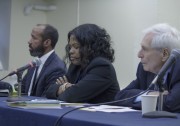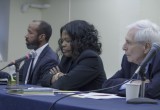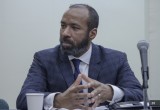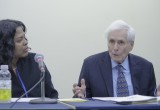
Group seeks to unravel the historical complexities of Indigenous and African people using the United States as a case study by dissecting the framework of colonialism, enslavement and the creation of race at a Parallel Event of the 60th Session of United Nation Commission on the Status of Women.
New York, NY, March 28, 2016 (Newswire.com) - In a meeting at the International Social Justice Commission in New York City, founder and president of United Nations NGO, the United States Sustainable Development Corp, Ava Gabrielle-Wise moderated a discussion intended to begin a process of expanding the public discourse on United States history to include the creation of race and the homogenization of people from a diversified mix of cultural origins into the binary culture of white and black as a pre and post-colonial economic and political tactic.
The panel for the meeting entitled "Understanding the Role of National Identity in Global Politics", included historians Jeffrey Ogbar, PhD and William Loren Katz. A handout circulated at the meeting cited, "ethnic homogenization" laws that reclassified people of color from many national and ethnic backgrounds, including Moors, Mulatto, Indian, Negro and others into "negro or black" and consequently "slave". This effectively created an antithetical people group that became known as “white”, and consequently “master”. The fixing of this binary code permanently into the sociopolitical culture of the United States, continues to permeate every phase of its institutional development. Gabrielle-Wise sees the elevation of authentic history by an accredited United Nations NGO as a restorative act; to convene representative voices in hope to restore dignity to the legacy of hundreds of proud people groups and ultimately integrity to the history of American people who made invaluable contributions to its foundation.
"...there is some scholarship, there just aren't many active agents of change to effectively promote that scholarship and redirect the current of the existing public narrative."
Ava Gabrielle-Wise, President/CEO, USSDC
"There is a misconception that there is no scholarship on the history of the resistance alliances between indigenous and African people both before and after the founding of the United States," said Gabrielle-Wise, "but the reality is there is some scholarship, there just aren't many active agents of change to effectively promote that scholarship and redirect the current of the existing public narrative.” Some point to the lack of credible scholarship as an intentional effort to control the message. As the first English colony in North America, it is in Virginia that the precedent for many of the founding principles about cultural legacy was established. The absence of such scholarship for much of the 20th century on the untold history of Indigenous and African alliances in the Commonwealth, was according to blood quantum scholar, Dr. Arica Coleman, “a deliberate effort to construct a White-Indian only historicity and as a means to validate the racial integrity of recognized Virginia Indian tribes”, the outcome of which continues to “promote and protect error, irrationality and unfairness.”
Both Ogbar and Katz contributed to the furtherance of restoring the authentic history in the panel discussion. Katz cited several historic resistance efforts shared by African and Indigenous people against Europeans as they attempted to colonize the Americas. He went on to recall the continued efforts in the United States to perpetuate the negation of the relationship between Indigenous and African people in film by erroneously casting African-Indigenous people with Europeans. Ogbar detailed the legacy of citizenship and identity through the coded and encoded language that has been both imprinted by the existing historical narrative and that which continues to chart the course for the current condition of people of color in the United States.
Share:





